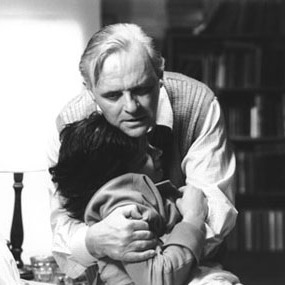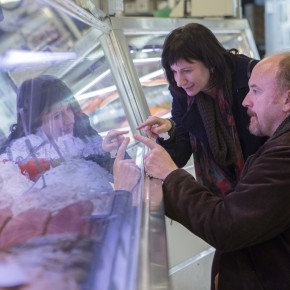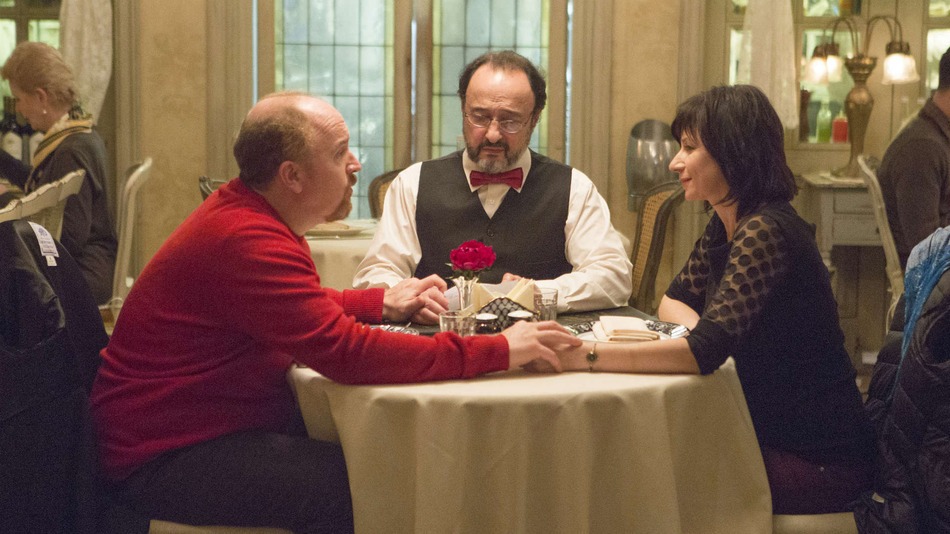
Blake (B.I.C) and I both share a fondness for the television show, “Louie”, so we felt compelled to have an email conversation this week about the episodes entitled “Elevator” (parts 1-6). Here is the edited and streamlined result of an exchange between a couple of guys with certifiable Louis C.K. man crushes.
 B.I.C: So, Howie, what did you think of the six-part Elevator episodes of Louie and what do you think the central idea behind them was?
B.I.C: So, Howie, what did you think of the six-part Elevator episodes of Louie and what do you think the central idea behind them was?
Howie: Well, I think they’re called Elevator (parts 1-6) because that’s the situation that led to him meeting Amia—a Hungarian woman who cannot speak English and eventually becomes his love interest. The first episode contained two crises: the first was losing Jane, his youngest daughter, on the NY subway and the second, right after the first, was when an older Hungarian lady in his apartment complex played by Ellen Burstyn—who is fantastic, by the way—becomes stuck in the apartment elevator and Louie happens to be present during the ordeal. It is clear that he felt reluctant and put upon by the whole thing. The scene in which he was sent to wake up Amia to tell her that her aunt is stuck is so well done. We see Louie in anguish over how to wake her up without touching her in a compromising place. It’s a beautiful scene, and it sets the tone for their whole relationship throughout the six episodes. In fact, it would be interesting to compare and contrast this scene with a scene in a later episode in which Louie comes upon his other love interest (Pamela) asleep and reacts VERY differently.
As for the central idea, I think the basic theme of “Elevator” is the high risk, relationally, to pursue love, wonder, and beauty even when you can’t communicate with it, and even when you know it has an expiration date. It’s not unlike C.S. Lewis’s reluctance to pursue Joy Gresham. There’s a line in “Shadowlands” in which Gresham tells Lewis – “the joy and the pain, both together, that’s the deal”. The doctor in the Elevator episodes (Charles Grodin) plays the role of the sage – dispensing (Godly?) advice to Louie – “misery is wasted on the miserable, don’t you see?, the togetherness and the sex weren’t the best part, the best part is now – the sadness, the missing her, that’s where the love is….when that fades, that’s when you become miserable”….powerful stuff. What did you think?
B.I.C: I couldn’t have said it any better than that, especially when it comes to the relationship between Lewis and Gresham being a nice point of comparison. Even though their communication issues were not in actual languages, it still seemed, at least from my reading of their relationship, to be an emotional communication breakdown. It just goes to show that the effects of the proverbial “Tower of Babel” goes far beyond and much deeper than just spoken language.
 Let me say that this season “feels” disjointed “to me.” That could just be me not picking up on some threads that really are there and are tying the seasons together. The way I view Louie is that the first season was a typical comedian getting his own show kind of season. Definitely a rise above most, but it still felt like an episode-to-episode, topic of the week show. The second and third seasons felt cohesive, whole. This season sets the viewers up to get the picture of bigger, longer narratives with the episode titles, but it doesn’t always feel like they connect as well to each other even though the main storyline is still there. There are little vignettes throughout those six episodes that were wonderfully funny or profound, but I thought they may have obscured the central story too much.
Let me say that this season “feels” disjointed “to me.” That could just be me not picking up on some threads that really are there and are tying the seasons together. The way I view Louie is that the first season was a typical comedian getting his own show kind of season. Definitely a rise above most, but it still felt like an episode-to-episode, topic of the week show. The second and third seasons felt cohesive, whole. This season sets the viewers up to get the picture of bigger, longer narratives with the episode titles, but it doesn’t always feel like they connect as well to each other even though the main storyline is still there. There are little vignettes throughout those six episodes that were wonderfully funny or profound, but I thought they may have obscured the central story too much.
Speaking of the “Tower of Babel”, what was going on with those surreal newscasts through the Elevator episodes? I get that he was commenting on the sensationalist lunacy of cable network news that just adds to the noise—adding to Babel’s confusion of communication—but it felt a little over the top to me.
Howie: I think you’re dead on with the Tower of Babel feel to the newscasts. Actually, this goes back to your “disjointed” comment. I think the newscasts represent a continual theme across the seasons of the show. Louie hates it when people don’t just say what they’re really saying, or thinking. He’s tired of being this way himself, and he’s looking for opportunities to be vulnerable and real. In the newscasts, C.K. is suggesting what newscasters might say if they just said what they’re “really saying”. The best example is the newscast where they say “Our top story – Lebron James died today in the hurricane in South Florida. By the way, six million other people died in the hurricane in South Florida today. Repeating our top story, Lebron James died today.” His point – the world around us doesn’t care about us. We need to care for ourselves and infuse our own meaning. This is why Louie is constantly talking to his girls about “how to survive”. He’s trying to keep them from being one of those no-named people that are mentioned as “dead” in the newscasts.
B.I.C: That is a very interesting take on the use of the newscasts in this season. I am still not sure they really “work” for me, in the end, but I really appreciate your take on it. The survivalist mentality that Louie has in his own mind and that he teaches his girls is interesting and I think he is spot on with the diagnosis—that at the end of the day the world is indifferent, or in opposition, to us, our lives are one in billions, nothing to cry over—but I think where I would differ from Louie, possibly, is that survivalism on it’s own merits ends up becoming self preservation in most cases. I think his diagnosis is right, but his spoken words are too selfish. His actions, however—when he goes to get his ex and his girls in the storm—say otherwise. There are tons of great scenes in those six episodes, what was one of your favorites?
Howie: My favorite moment in the 6 parts (among so many) was when Amia (non-verbally) told Louie that she needed to buy a hairdryer. As we watch Louie, he is absolutely captivated by Amia’s elaborate “acting out” of a scenario in which a woman would need a hairdryer. We watch Louie expressing (just with his eyes!) the moment when he falls in love. The guy doesn’t get enough credit as an actor. What about you?
B.I.C: As far as just a beautiful and extremely humorous scene between Louie and Amia, the hair-dryer charades takes it every time. Whenever language fails us, humans become creative, hence the game of charades and C.K. writes it into the scene so well and yet it continues to catch us off guard.
The scene where Louie introduces Amia to Jane, his youngest daughter, and Amia brings out her violin and her and Jane play together. That is just one of those powerful moments where music speaks volumes louder than spoken words do and, then, the subsequent moments thereafter where Amia is interacting with the kids—Jane and Lilly— by playing chess and violin together. It was moments like that which warmed my soul.
https://www.youtube.com/watch?v=j8UzeF7N9Bc
Howie: I love those scenes, especially because they followed Jane’s soliloquy about why she hates school. The actress playing Jane is awesome by the way. Jane’s little speech reflected Louis C.K.’s cynicism toward people and life in general. Jane is too smart for her own good, probably like C.K. was as a kid. Louie certainly doesn’t want Jane to grow up with his worldview. In Amia, he sees someone who can infuse grace and beauty into Jane’s distorted world and broken family. This makes Louie and Amia’s inevitable parting all the more sad.
B.I.C: I find it interesting that kids often mimic the worldview of their parents and, if it’s not necessarily a positive one, the parents try to rid their kids of it. But it’s a fool’s errand. The proverbial “shit” runs down hill. That’s why kids and parents often get at each other so often because they are more alike than different. It takes an outsider to translate to each party when they are talking past each other. Someone coming into the situation who, like you said, infused a grace and beauty that was able to heal a family, temporarily, of course, by taking them to a time before the Tower of Babel, before language became confused and broken.
I, also, liked the parts where Louie and Amia end up finally consummating the relationship and the emotional and awkward disconnect that took place afterwards.
Howie: Yes. The best moments of the show over the seasons have been the uncomfortable ones. It was fascinating in the next episode when Louie was telling his buddy that “it got serious last night, because we were intimate”. His buddy’s response: “That was true in 1958, but women are pigs now, just like us”. Wow. I love that Louie rejects this notion and recognizes the “full weight” of consummation.
B.I.C: Yes! There was an element to the act that changed everything. I think that the reason why I love the show so much is that it doesn’t preach at you, but it is more willing to show the full weight of choices made in relationships and the past and so on. And it does it well, with good dialogue, humor and solid moments of grace throughout. This show does so well at getting past the entire linguistic game to show the wonder of human connection, interaction and relationships.
Howie: We can’t forget the classic scene in Elevator 6 where Amia and Louie, after failing to deal with the emotions and disconnects that happened after having sex, end up going to a Hungarian restaurant where Amia has a waiter (who spoke both languages) sit down and read the letter she wrote to Louie about why they ultimately could not be together. That scene had me in tears on my second viewing. One thing about Louie, most episodes hold up well to repeat viewing, and even carry more gravitas.
B.I.C: I couldn’t agree more. I admit I got a chuckle out of that scene when Louie, in responding to Amia’s letter, holds the hand of the waiter as if he is transferring his reactions onto the one who is the middleman. And, yet, something about it felt profound that there is a chasm between two persons and someone has to be the intermediary to relay the dialogue and response. I thought it was powerful.
Howie: I didn’t quite catch Louie holding the waiter’s hand, staggering. I also think that after Louie’s first failed attempt at this moment—in Amia’s aunt’s apartment—he realized that Amia’s aunt was not an “impartial translator” and that he needed someone from the outside to mediate. In so doing, Louie gave the waiter a gift he’ll look back on and cherish, a starring role in a transparent moment between two parting lovers
B.I.C: I like how you say that the waiter gained a “gift that he will look back on and cherish.” I didn’t think about that. But, you know, it’s so true. I have a few moments in my life where I was not the main character—My Life starring me!—and I was able to witness something truly sweet or profound or gracious between other people. I was a minor character, a mere witness, and those moments gave me more joy than most things that have happened to me, directly.

COMMENTS
Leave a Reply













